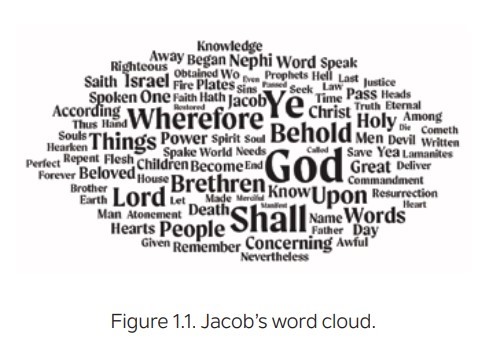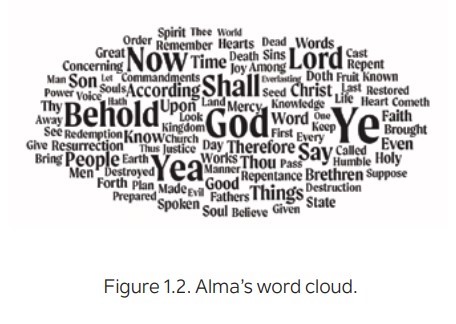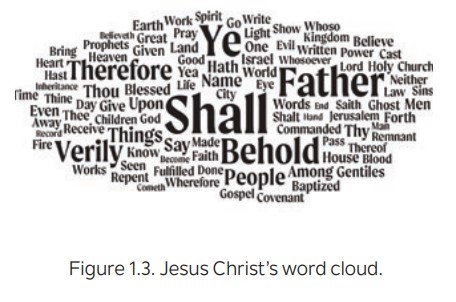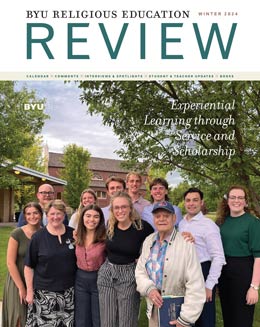John Hilton III (john_hiltoniii@byu.edu) is a professor of ancient scripture at Brigham Young University.
Think about some of your closest friends or family members. Are there distinctive words or phrases that they use often? Many of us could identify a person who is speaking or writing simply by the words they choose to use. For the past twelve years, I have been exploring the extent to which this is true for the different speakers in the Book of Mormon. Because the Book of Mormon purports to be a multiauthored work, we would expect to see differences between distinctive voices such as Jacob, Alma, and Jesus Christ. And that is exactly what we find. As a simple way of visualizing some of the distinctive voices in the Book of Mormon, compare the following three word clouds:



A glance at these word clouds shows different words that are emphasized by each of these speakers. Jacob speaks of brethren, Alma says now, and Jesus honors the Father with distinctive frequencies. And these word clouds only scratch the surface. Consider the following:
- The phrase “my soul delighteth” appears eleven times in the Book of Mormon, in multiple chapters, but it is used only by Nephi.
- Jacob and Nephi use the words God and Lord with statistically different patterns from each other; moreover, 2 Nephi 9–10 clearly shows Jacob’s pattern of speech rather than Nephi’s. This is significant since Jacob is the speaker in 2 Nephi 9-10, and the speech patterns in 2 Nephi 9–10 are different than 2 Nephi 4–5, 11, where Nephi is the speaker.
- When Alma teaches his son Corianton, he uses several specific phrases from Abinadi, nearly all of which relate to the concerns Corianton had. In other words, Alma uses the words of scripture or recent prophets to address his child’s needs, setting a wonderful model for modern parents.
- Jesus Christ uses the word baptize significantly more than any other individual. He consistently emphasizes baptism when he speaks, both inside and outside of 3 Nephi. This clearly shows how he views the importance of baptism.
I began my research in 2011 when, in collaboration with several colleagues, we split apart the text of the Book of Mormon by the person who is speaking. The Book of Mormon changes more than seventeen hundred times. An example from Jacob 5 illustrates the layers of quotations that can be more closely examined through a study of individual voices. In the following passage, notice how Jacob quotes Zenos, who in turn quotes the Lord (who portrays the voice of the master of the vineyard):
Jacob
1 Behold, my brethren, do ye not remember to have read the words of the prophet Zenos, which he spake unto the house of Israel, saying:
Zenos
2 Hearken, O ye house of Israel, and hear the words of me, a prophet of the Lord.
3 For behold, thus saith the Lord,
The Lord
I will liken thee, O house of Israel, like unto a tame olive-tree, which a man took and nourished in his vineyard; and it grew, and waxed old, and began to decay.
4 And it came to pass that the master of the vineyard went forth, and he saw that his olive-tree began to decay; and he said:
The Master of the Vineyard
I will prune it, and dig about it, and nourish it, that perhaps it may shoot forth young and tender branches, and it perish not.
Who Speaks in the Book of Mormon?
My colleagues and I identified 149 different voices are present in the Book of Mormon, many of these are individuals who speak only a few words, including people from Amnor to Zeram.[1] The top five speakers follow:
| Rank | Speaker | Words spoken | Words as a percentage of text |
| 1 | Mormon | 97,591 | 36.4% |
| 2 | Nephi | 28,166 | 10.5% |
| 3 | Alma | 20,051 | 7.5% |
| 4 | Moroni2 | 19,513 | 7.3% |
| 5 | Jesus Christ | 14,161 | 5.3% |
Once we identified the different voices in the Book of Mormon, we worked with the developers of the WordCruncher software program (published by BYU’s Digital Humanities Department) to develop a database we called “Voices in the Book of Mormon.” This database can be used to determine who spoke a particular word or phrase in the Book of Mormon—it is freely available at https://
Carefully analyzing individual Book of Mormon voices can help us better understand the unique viewpoints, speaking patterns, and personalities of those who speak in the Book Mormon, leading to spiritual insights we might otherwise miss.
In addition, annotating the text of the Book of Mormon with names of the individuals who speak makes it easier to see the text’s intricacy. This complexity strongly suggests that the Book of Mormon is a multiauthored work and that Joseph Smith did not write the Book of Mormon. While not required for deep spiritual conviction, this type of intellectual evidence can strengthen our faith. As Austin Farrar wrote, “Though argument does not create conviction, the lack of it destroys belief. What seems to be proved may not be embraced; but what no one shows the ability to defend is quickly abandoned. Rational argument does not create belief, but it maintains a climate in which belief may flourish.”[2]
I have written several papers analyzing various aspects of the unique voices in the Book of Mormon. I recently synthesized my work in the new book Voices in the Book of Mormon: Discovering Distinctive Witness of Jesus Christ, published by BYU’s Religious Studies Center. Ultimately, I hope that the unique voices in the Book of Mormon can strengthen people’s interest in and testimony of the Book of Mormon, the good people that grace its pages, and the validity of this book of scripture. I also hope that reading the Book of Mormon with the lens of “who is speaking” can help us find life-changing doctrines taught by specific individuals with unique voices.
Notes
[1] Amnor and Zeram are quoted as speaking together, along with Manti and Limher, in Alma 2:24–25.
[2] Austin Farrar, “Grete Clerk,” in Light on C. S. Lewis, comp. Jocelyn Gibb (New York: Harcourt and Brace, 1965), 26; cited in Neal A. Maxwell, “Discipleship and Scholarship,” BYU Studies Quarterly 32, no. 3 (1992): 5.
